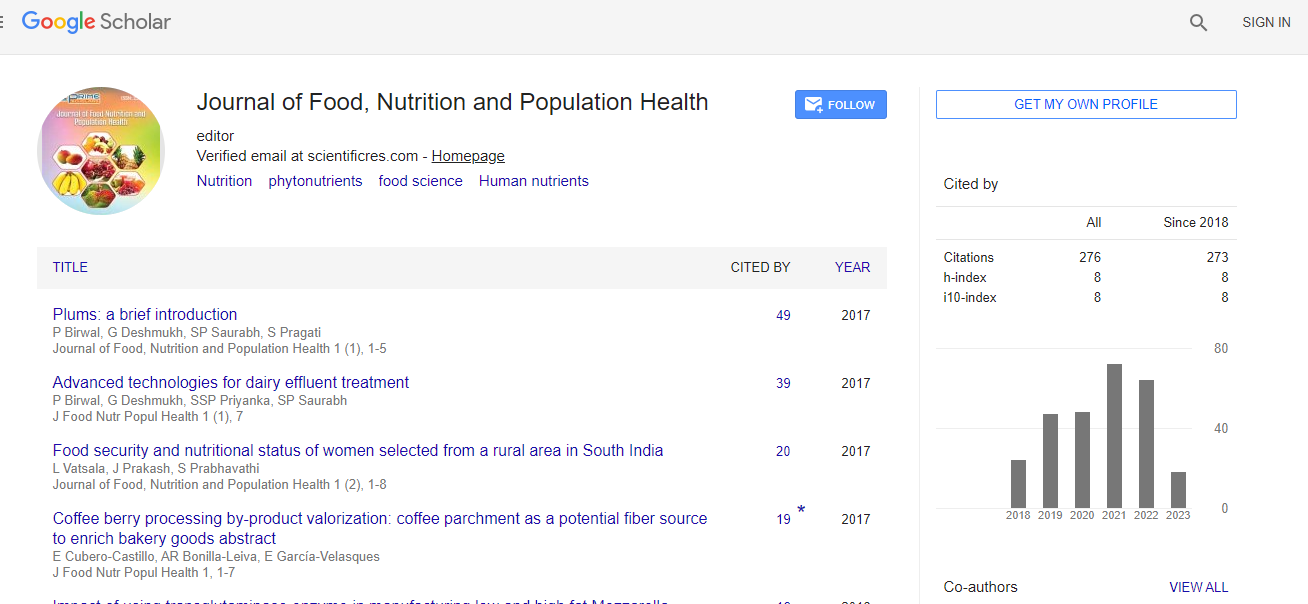Commentary - (2024) Volume 8, Issue 2
The Complexities of Malnutrition and the Imperative of Food Policy Reform
John Anderson*
Department of Agricultural Sciences, North West University, South Africa
*Correspondence:
John Anderson,
Department of Agricultural Sciences, North West University,
South Africa,
Email:
Received: 29-May-2024, Manuscript No. IPJFNPH-24-20863;
Editor assigned: 31-May-2024, Pre QC No. IPJFNPH-24-20863 (PQ);
Reviewed: 14-Jun-2024, QC No. IPJFNPH-24-20863;
Revised: 19-Jun-2024, Manuscript No. IPJFNPH-24-20863 (R);
Published:
26-Jun-2024, DOI: 10.21767/2577-0586.8.2.17
Introduction
Malnutrition, a global health challenge affecting millions,
encompasses both undernutrition and over nutrition,
presenting a paradoxical scenario where undernourished
populations coexist with those suffering from obesity and dietrelated
diseases. Addressing this multifaceted issue requires
comprehensive food policies that go beyond mere hunger
alleviation to promote sustainable, nutritious diets for all. This
article explores the complexities of malnutrition, analyses
current food policies, and advocates for reform to achieve
healthier populations worldwide. Malnutrition manifests
in diverse forms, reflecting both undernutrition and over
nutrition. While undernutrition, including stunting, wasting,
and deficiencies in essential nutrients, affects primarily lowincome
countries and vulnerable populations, over nutrition
characterized by obesity and diet-related chronic disease is
increasingly prevalent worldwide, even in regions grappling
with food insecurity. This dual burden highlights the complexity
of malnutrition and underscores the need for nuanced policy
responses. Food policies globally aim to ensure food security,
promote adequate nutrition, and mitigate diet-related health
risks.
Description
These limitations perpetuate cycles of malnutrition and
inhibit sustainable development goals. Socio-economic
factors profoundly influence malnutrition. Poverty,
inadequate infrastructure, and limited access to nutritious
foods exacerbate undernutrition, particularly in rural and
marginalized communities. Conversely, the globalization
of food systems has contributed to dietary shifts towards
processed foods high in sugars, fats, and salt, fuelling the rise
of obesity and Non Communicable Diseases (NCDs) in both
developed and developing countries. Balancing affordability,
accessibility, and nutritional quality remains a critical challenge
for policymakers. Achieving sustainable nutrition requires a
paradigm shift in food policy. Comprehensive reforms should
integrate agriculture, health, and environmental policies
to promote food systems that are equitable, resilient, and
nutrition-sensitive. Supporting diversified farming systems
that prioritize nutrient-rich crops and sustainable agricultural
practices. Implementing regulations and incentives to improve
food environments, including promoting local food systems,
reducing food waste, and limiting the marketing of unhealthy
foods to children.
Conclusion
Successful examples of food policy reforms can offer valuable
insights. Countries like Brazil have demonstrated significant
progress in combating malnutrition through innovative
programs such as the National School Feeding Program, which
integrates local agricultural production with school meals to
improve nutrition among children. Similarly, Thailand’s public
health campaigns and regulatory measures have reduced salt
consumption and lowered rates of hypertension, showcasing
the impact of targeted interventions on population health
outcomes. Addressing malnutrition requires coordinated
efforts across borders and sectors. International organizations,
including the World Health Organization (WHO), the Food
and Agriculture Organization (FAO), and the United Nations
(UN), play crucial roles in setting global nutrition guidelines,
monitoring progress, and facilitating knowledge sharing among
countries. Despite progress, significant challenges persist in
advancing food policy reform.
Acknowledgement
None.
Conflict Of Interest
None.
Citation: Anderson J (2024) The Complexities of Malnutrition and the Imperative of Food Policy Reform. J Food Nutr Popul Health. 8:17.
Copyright: © 2024 Anderson J. This is an open-access article distributed under the terms of the Creative Commons Attribution License, which permits unrestricted use, distribution, and reproduction in any medium, provided the original author and source are credited.

